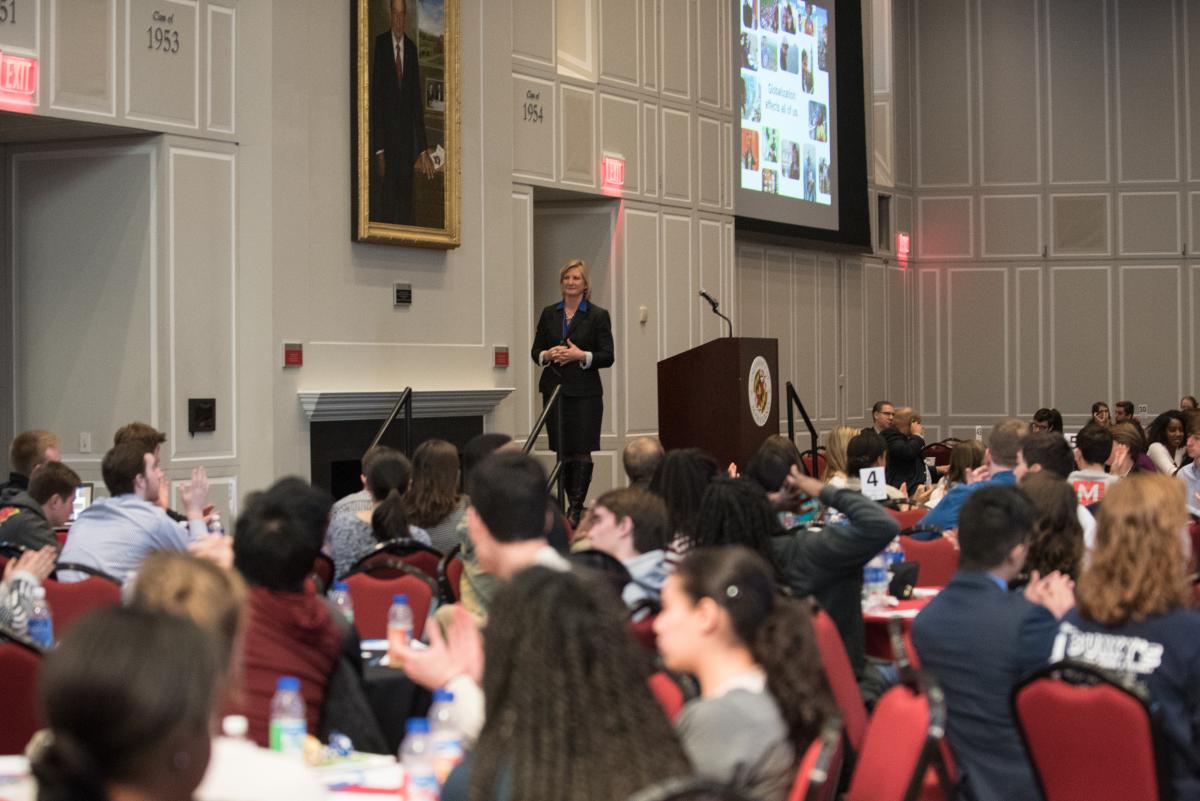
Smith student Philip Peker ’18 writes about a Smith Start event on global perspective and diversity for freshmen at the University of Maryland’s Robert H. Smith School of Business on Feb. 18, 2016.
Every year, the town of College Park, Md., sees an influx of thousands of new students from every corner of the nation and even the world. You step into a classroom and you may find a student from Minnesota, Japan or Panama. The teachers that mold and inspire the great minds of the future here at UMD come from all parts of the globe: Lebanon, Germany, India, China, Romania, Nigeria, the list goes on and on. The companies and organizations that are studied meticulously in the classroom, from Pepsi to Apple, from KPMG to Samsung, are global entities with a global workforce and global assets. Take a stroll through Van Munching Hall, and you’re guaranteed to hear more than just the English language. So why is the global mindset so important? The answer is much closer to home than you think.
On Feb. 28, Smith freshmen were invited to engage in topics on global perspective and diversity by the Young Professionals Institute as a part of the larger Smith Start program. Featured speaker Stacie Berdan, international career expert and author, inspired and challenged the students to begin thinking globally. The event also included an expert panel of global professionals in a variety of fields, as well as a question and answer session.
I was lucky enough to get some one-on-one time with a few of the keynote speakers, including Stacie, and they enthusiastically explained the true importance of not only thinking globally, but taking the necessary measures to be a globally conscious student. “Students should be inspired, perhaps required, to follow world news, pay attention to global stock markets and currencies, and keep an eye on global events and international business trends,” said Stacie.
The classroom can be a huge resource for global studies, and should not be overlooked for its geographic restrictions. Stacie attributes her development as a business leader and professional thanks to her ability to think globally and be adaptable. “If I didn't have a global mindset, I would never have been considered for my transfer to Hong Kong where I worked for three years and throughout the region. I would not have been able to grow the bottom line for my consulting company in the Asia Pacific region.”
Growing into a global professional was not an overnight incidence for Stacie. She learned from her mistakes, such as being unaware of certain cultural customs or the limits imposed by language barriers, and leveraged her errors into tools for growth. Stacie’s advice for the young students was to, first and foremost, pick up a foreign language, and immerse oneself in the culture, traditions, and ethnic background of the language while studying it. It’s not enough to just study the grammar and lexicon of the tongue, one must apply this within a human context, and use it to interact and live with native speakers of the language. If language is a tool for communication, there is no feasible way that it can be learned in a vacuum without the inclusion of human interaction and the context of culture.
Companies are setting the by ever higher when looking for talented, intelligent, and charismatic young professionals. Rebecca Bellinger, managing director at the Office of Global Initiatives and the Center for International Business Education (CIBER) at Smith, explained why students who are looking for competitive jobs need to have a global mindset. “Seventy-five percent of companies surveyed by CIBER in 2014 said that a global perspective is important for both entry level and management staff,” she said. By having your resume highlight your global business acuteness by knowing other languages, study abroad experience, or taking international business classes, your name will stand out amongst the skyscraping stacks of resumes on the employers desk. Rebecca stressed how ubiquitous international business is, even in locales like College Park. “Over 95 percent of consumers live outside the U.S., so even if you are not majoring in international business or thinking now that your career will take you abroad, invest now in developing your global mindset and skillset so that you will be well-prepared for any situation you encounter after graduation.”
The richness and depth of information provided that evening was both inspiring and daunting. Luckily, the Office of Global Initiatives at Smith constructed a handy pamphlet for every student that detailed how one can become a young professional with a global perspective. The pamphlet is by no means exhaustive, but it is a great introduction how a student at the University of Maryland, can poise oneself to become a mover and shaker at the University of the World.
For more information about global programs at Smith, visit www.rhsmith.umd.edu/global.
Media Contact
Greg Muraski
Media Relations Manager
301-405-5283
301-892-0973 Mobile
gmuraski@umd.edu
About the University of Maryland's Robert H. Smith School of Business
The Robert H. Smith School of Business is an internationally recognized leader in management education and research. One of 12 colleges and schools at the University of Maryland, College Park, the Smith School offers undergraduate, full-time and flex MBA, executive MBA, online MBA, business master’s, PhD and executive education programs, as well as outreach services to the corporate community. The school offers its degree, custom and certification programs in learning locations in North America and Asia.